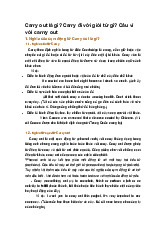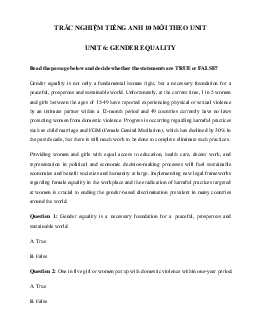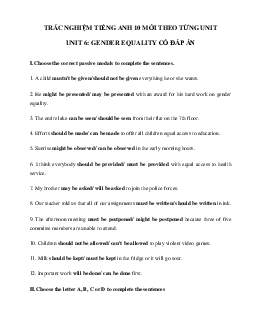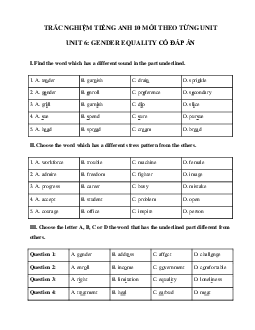






Preview text:
TRẮC NGHIỆM TIẾNG ANH 10 MỚI THEO TỪNG UNIT
UNIT 6: GENDER EQUALITY CÓ ĐÁP ÁN
Choose the letter A, B, C or D to complete the sentences with given words
Question 1: I/ not/ think/ women’s/ natural roles/ be/ care-givers/ housewives.
A. I not think that women’s natural roles are care-givers and housewives.
B. I not think that women’s natural roles is care-givers and housewives.
C. I don’t think that women’s natural roles is care-givers and housewives.
D. I don’t think that women’s natural roles are care-givers and housewives.
Question 2: Women/ be/ hard-working/ than/ men/ although/ they/ be/ physically weaker.
A. Women are more hard-working than men although they are physically weaker.
B. Women are more hard-working than men because they are physically weaker.
C. Women are hard-working than men because they are physically weaker.
D. Women are hard-working than men although they are physically weaker.
Question 3: Men/ should/ share/ housework/ tasks/ wives.
A. Men should to share housework tasks with wives.
B. Men should share housework tasks to their wives.
C. Men should share housework tasks to wives.
D. Men should share housework tasks with their wives.
Question 4: Women/ usually/ get/ less/ pay/ men/ for/ do/ same job.
A. Women usually get less pay than men for do the same job.
B. Women usually get less pay than men for doing the same job.
C. Women usually get less pay than men for doing same job.
D. Women usually get less pay as men for doing the same job.
Question 5: We/ promote/ strategies/ prevent/ violence/ discrimination/ against/ girls, boys and women.
A. We promote strategies prevent violence and discrimination against girls, boys and women.
B. We promote strategies to prevent violence and discrimination against girls, boys and women.
C. We promote strategies to preventing violence and discrimination against girls, boys and women.
D. We promote strategies preventing violence and discrimination against girls, boys and women.
Rearrange the sentences to make meaningful sentences
Question 1: I/ not/ married/ pursue/ think/ should/ a/ not/ career.
A. I think married women should not pursue a career.
B. I think not married women should pursue a career.
C. I think women married should not pursue a career.
D. I think a married women should not pursue career.
Question 2: adolescent/ UNICEF/ girls’ health/ helps/ and/ adolescent/ wellbeing/ countries/ advance.
A. UNICEF helps advance countries adolescent girls’ health and wellbeing.
B. UNICEF helps countries advance girls’ health and adolescent wellbeing.
C. UNICEF helps advance countries and adolescent girls’ health wellbeing.
D. UNICEF helps countries advance adolescent girls’ health and wellbeing.
Question 3: Girls/ of/ and/ women/ negative/ of/ suffer/ gender/ most/ norms/ the/ and/ impacts/ rigid/ roles.
A. Girls and women suffer the most of rigid impact of negative gender norms and roles.
B. Girls and most of women suffer the negative rigid impact of gender norms and roles.
C. Girls and women suffer most of the negative impact of rigid gender norms and roles.
D. Girls and women suffer most of the negative norms and roles impact of rigid gender.
Question 4: against/ may/ a/ Employers/ female/ employee/ not/ based/ discriminate/ on/ a/ pregnancy.
A. Employers may discriminate not against a female employee based on a pregnancy.
B. Employers may not discriminate against a based on female employee a pregnancy.
C. Employers may not discriminate against a female employee based on a pregnancy.
D. Employers not may discriminate against a female employee based on a pregnancy.
Question 5: Women/ to/ are/ be/ less/ receive/ and/ likely/ promoted/ than/ be men
A. Women are less likely than men to receive training and be promoted.
B. Women be less likely than men to receive training and are promoted.
C. Women are less likely than men receive to training and be promoted.
D. Women are less likely than men receive training and to be promoted.
Rewrite sentences without changing the meaning
Question 1: It’s boring and tiring to do housework.
A. Doing housework is boring and tiring.
B. It’s interesting doing housework. C. Don’t do housework.
D. Boring and tiring is housework.
Question 2: We should promote female’s right to vote.
A. Female’s right to vote should be promoted.
B. Right female’s vote should promote.
C. Promoting female’s right to vote is important.
D. We won’t want females to vote.
Question 3: Women spend more time on unpaid domestic work in comparison with men.
A. Some women’s work is unpaid.
B. Women have to do more housework than men.
C. In comparison, men spend more time on unpaid domestic work.
D. Women should spend more time on unpaid domestic work
Question 4: It is necessary to have policies that were inclusive for women and vulnerable groups.
A. We don’t need to have policies that were inclusive for women and vulnerable groups.
B. Policies that were inclusive for women and vulnerable groups need to be passed.
C. Necessarily, having policies that were inclusive for women and vulnerable groups.
D. Women and vulnerable groups should be protected.
Question 5: Obesity may be considered a serious health problem. A. We shouldn’t be obese.
B. Serious health problem is considered.
C. We think obesity is a serious health problem.
D. Being obese is good for health.
Rewrite the sentence using modal verbs in passive.
1. Parents should give children a lot of love.
Children ____________________________________
2. Each student must write an essay on gender equality.
An essay ____________________________________ 3. You must wash your hands.
Your hands ____________________________________
4. He can speak four languages.
Four languages ____________________________________
5. You must keep dogs outside shops.
Dogs ____________________________________
6. The Vietnamese government will make more progress in gender equality.
More progress ____________________________________
7. Children should treat old men with respect.
Old men ____________________________________
8. They should give men and women equal pay for equal work.
Men and ____________________________________
9. My classmates used to call me John.
I ____________________________________ 10. He can't repair my bike.
My bike ____________________________________ Đáp án
Choose the letter A, B, C or D to complete the sentences with given words
1 - D; 2 - A; 3 - D; 4 - B; 5 - B;
Rearrange the sentences to make meaningful sentences
1 - A; 2 - D; 3 - C; 4 - C; 5 - B;
Rewrite sentences without changing the meaning
1 - A; 2 - A; 3 - B; 4 - B; 5 - C;
Rewrite the sentence using modal verbs in passive.
1 - Children should be given a lot of love by parents.
2 - An essay on gender equality must be written by each student.
3 - Your hands must be washed.
4 - Four languages can be spoken by him.
5 - Dogs must be kept outside shops.
6 - More progress will be made by the Vietnamese government in gender equality.
7 - Old men should be treated with respect by children.
8 - Men and women should be given equal pay for equal work.
9 - I used to be called John by my classmates.
10 - My bike can’t be repaired by him.



